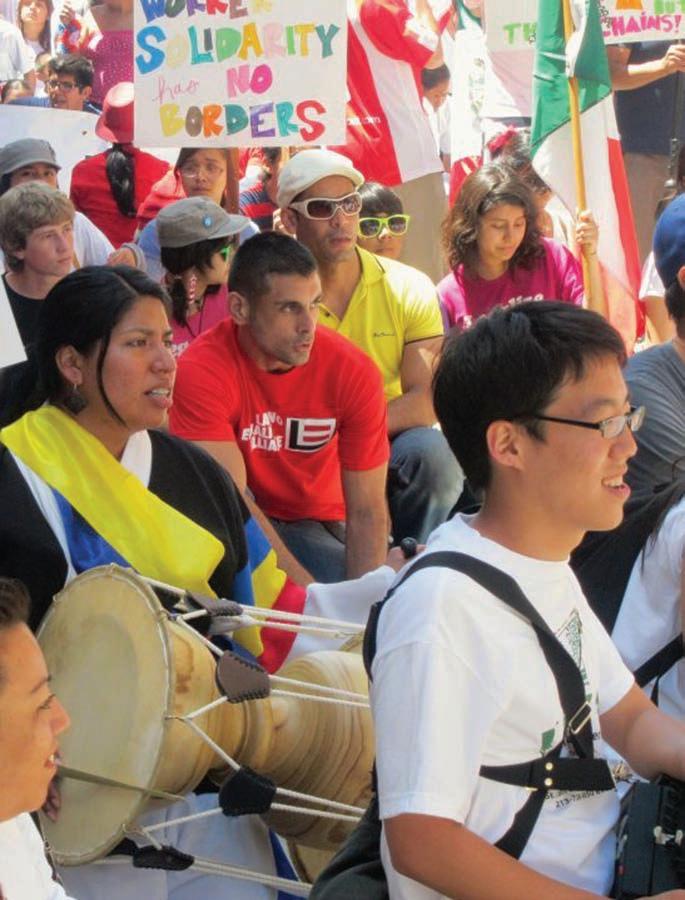
4 minute read
SOMETHING’S HAPPENING HERE
Our theory of change is that everyday people pulling their power and being strategic can change the trajectory of development in their community and the development of their society. And our work is to prepare people and involve people in that process. We take the position that history doesn’t happen, history is what people make happen – and we want to be those people.
– Marqueece Harris-Dawson, Community Coalition
This summary is but a partial story – and we know that the full report is as well. We have already hinted at what we left out, partly by virtue of the fact that we could not talk to everyone, partly because we had a specific focus on particular sorts of movement builders, and partly because we had page limits in both this summary and the full report. It is also important to acknowledge that this summary spends virtually no time (though the full report does) on the setbacks along the way, including the campaigns that did not work out, the victories that got lost in the implementation, and the coalitions that proved to be thin rather than thick, temporary rather than longlasting. Significant learning did take place when things went wrong. But our main point here is that so much has also gone right on the organizing front since the 1992 civil unrest shattered a city. Walking the burned wreckage of South L.A. and Koreatown, it would have been hard to imagine a world of community benefits agreements, Black and Brown youth advocating together for better schools, and an immigrant rights movement spanning the range of national origins. It would have been equally hard to glimpse this future if one stumbled upon the modest origins of LAANE in the corner of a union office, caught a glimpse of organizers stepping onto their first bus, or observed environmental justice organizers just beginning to understand how their various communities were linked. Part of what made it all happen was a particular arc of organizing over the past twenty years. L.A. essentially moved from traditional interest-based organizing to a more intentional bridge-building approach. This made sense: in a fragmented metropolis, interests can divide as much as unite, and one way to overcome this geographic and social reality was to link communities around broader values, broader concerns, and a broader
Part of what made it all narrative. The new approach happen was a particular led groups to constantly arc of organizing over the seek new collaborations and past twenty years. L.A. do so in a way that would essentially moved from lift up one’s partners as well traditional interest-based as one’s own organization. organizing to a more No one group could have intentional bridge-building done it alone – to match approach. the depth of the problems, one needed organizations that could get big while staying true to their mission, that could work effectively with one another in ways that were strategic not just tactical, and that could be thinking early on about how to align with parallel efforts in other metro areas. The remarkable sense of mutual support many have seen in L.A.’s social movements was not simply an accident of intertwined personal histories (although there was plenty of that) – it was a strategic choice.
We believe that we may be at the cusp – in L.A. and elsewhere – of yet another shift: a move toward transformative organizing. This sort of organizing is also based in a values frame but it pays closer attention to the personal growth and spiritual development of the organizer and community leaders, takes seriously that motivations are about purpose and passion as much as they are about politics and policy, and interacts well with faith-rooted efforts to shift the discourse on after divisive topics such as immigration. In a sense, this attention to deeper values has always been part of the picture: the earlier generation of activists featured in this report grew up at a time of mass social movements – the United Farm Workers, the Civil Rights movement, the Student Nonviolent Coordinating Committee – and were able to draw some of their spiritual motivation from those movements and their leaders. A new generation is having to operate and rise to tremendous challenges in what may be more arid times and a new transformative approach can help the movement and its organizers to have more sustainable lives – more inspiration, deeper reflection, and less burn-out.
The shift to transformative organizing may have an important additional merit: it can help progressives reach the middle of the political and cultural spectrum. That middle – the solid group of everyday residents working hard to get it right for themselves and their families – is driven by everyday concerns that must be addressed by a set of effective policies. But it is also convinced that there is something deeply wrong with a nation that is drifting apart rather than growing together. A ragtag group of activists managed to capture that national mood with Occupy Wall Street, lifting issues of inequality, pointing to a system jury-rigged for the rich, and finally breaking through into a national discourse long dominated by the cacophonous discourse of an individualist right. The fight is on – and it is not just about politics and policy, it is about the very soul of the country. And nothing less than transformative organizing will fit the bill.








